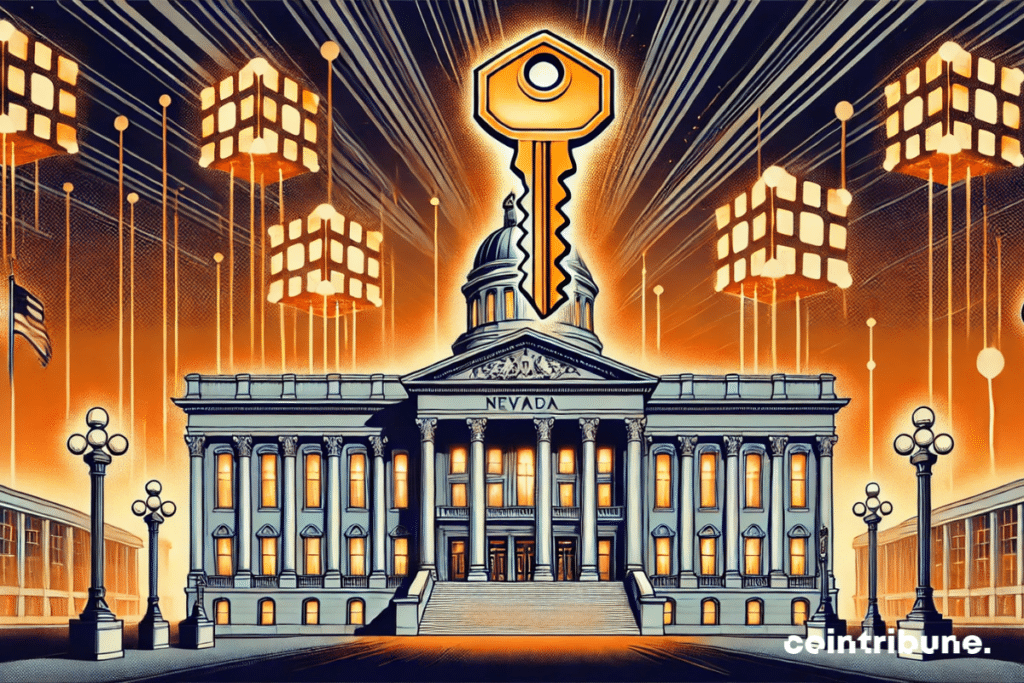Wed. December 11, 2024 ▪
5
min read ▪ by
American elections have always represented a global symbol of democracy and stability. However, in the digital age, they face unprecedented challenges, exacerbated by technological advances and threats to the integrity of electoral processes. Recently, Nevada was at the center of a major controversy related to accusations of “fake voters” in the 2020 presidential election. Although these accusations were dismissed, they exposed critical flaws in the voting system. electoral certification. Faced with this crisis of confidence, the State of Nevada made a bold decision by choosing blockchain technology to ensure the security and transparency of its elections. This adoption, hailed as a major step forward, aims to anchor electoral certifications in an immutable register, making any attempt at falsification virtually impossible.


Blockchain for electoral integrity
Nevada Secretary of State Francisco Aguilar announced an initiative on December 9, 2024 that could redefine election security standards in the United States. In a press release published on the official state platform, he unveiled the integration of blockchain technology in the process of certifying electoral results. To justify the measure, Aguilar said it was “a vital step to ensure the transparency and reliability of the results.”
Concretely, the blockchain will be used to record electoral certificates on an immutable digital register, with the aim of making any attempt to falsify or modify the data practically impossible. Such an innovation aims to respond to an increasingly urgent requirement: to restore public confidence in an electoral system weakened by past scandals.
In a context where the United States is intensifying its efforts to modernize its electoral infrastructure, Nevada hopes to establish itself as a national model of security and transparency. Even if the technical modalities of implementation remain to be clarified, the stated objective is clear. Aguilar highlighted his administration’s ambition to “ensure some of the most secure elections in the country,” with the goal of positioning Nevada at the forefront of democratic innovation.
Lessons from the past and perspectives
Nevada’s decision comes against a backdrop marked by the 2023 “false voters” affair. During this episode, six Republican officials in the state were accused of attempting to manipulate the results of the election. 2020 presidential election. Although these accusations were rejected by the courts, they reveal significant vulnerabilities within current electoral systems. According to Francisco Aguilar, these events revealed… “the urgency of protecting the electoral process against any attempt at corruption or alteration.”
In response to these challenges, Nevada does not simply seek to correct the mistakes of the past. By adopting blockchain, the state intends to redefine electoral security standards, both for itself and for the rest of the country. This initiative is not a first in the United States. Similar pilot projects have been undertaken in Alaska and Georgia, reflecting growing interest in this technology in the public sphere. However, Nevada hopes to go further by integrating this innovation into its certification system, with the aim of establishing a reference model for other states.
If this strategy proves effective, it could profoundly transform the way elections are organized at the national level. Through increased transparency and increased voter trust, blockchain could become a key lever to address a political climate often marked by allegations of fraud. More than a simple technological tool, this initiative illustrates a desire to reconcile citizens with a democratic process that is frequently criticized.
Through this adoption of blockchain, Nevada is closing gaps exposed by past election controversies, while paving the way for a more secure democracy. This approach, which combines technological innovation and institutional strengthening, illustrates a desire to restore citizen confidence in order to establish a model that other States can adapt. By choosing to place transparency at the heart of its priorities, Nevada is paving the way towards a future where emerging technologies become guarantors of civil rights and democratic stability.
Maximize your Cointribune experience with our “Read to Earn” program! For every article you read, earn points and access exclusive rewards. Sign up now and start enjoying benefits.
A graduate of Sciences Po Toulouse and holder of a blockchain consultant certification issued by Alyra, I joined the Cointribune adventure in 2019. Convinced of the potential of blockchain to transform many sectors of the economy, I took the commitment to raise awareness and inform the general public about this constantly evolving ecosystem. My goal is to enable everyone to better understand blockchain and seize the opportunities it offers. I strive every day to provide an objective analysis of current events, to decipher market trends, to relay the latest technological innovations and to put into perspective the economic and societal issues of this ongoing revolution.
DISCLAIMER
The views, thoughts and opinions expressed in this article belong solely to the author and should not be considered investment advice. Do your own research before making any investment decisions.




